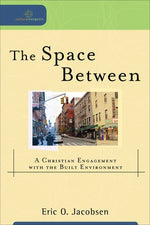Publisher: Baker Academic
ISBN: 9780801039089
Type: Paperback
"Jacobsen sets himself two goals: to get us to attend to urban space--the space between the buildings in a city or village--and to explain why Christians in particular should care about the quality of urban space. He succeeds admirably on both counts. A fine contribution to an extremely important topic."--Nicholas Wolterstorff, Yale University and University of Virginia
The entire material world can be divided between the Natural Environment and the Built Environment. Over the past forty years, the Natural Environment has received the greater share of attention of the two, but that is beginning to change. With a renewed interest in "place" within various academic disciplines and the practical issues of rising fuel costs and scarcity of land, the Built Environment has emerged as a coherent and engaging subject for academic and popular consideration.
While there is a growing body of work on the Built Environment, very little of it approaches the Built Environment from a distinctly Christian perspective. This major new work by Eric Jacobsen, author of the well-received Sidewalks in the Kingdom, represents a comprehensive and grounded approach. Jacobsen develops a framework for understanding the Built Environment and addresses timely and controversial topics such as gentrification, urban sprawl, and energy consumption. Employing tools from the field of theology and culture, he demonstrates how looking at the Built Environment through a theological lens provides a unique perspective on questions of beauty, justice, and human flourishing.
The Space Between is embellished with plentiful photographs, illustrations, charts, and exercises and will be of interest to students in cultural hermeneutics, theology and culture, urban ministry, or New Urbanism/Built Environment courses at the college and seminary level. Pastors, missionaries, church planters, and Christian professionals will also find it of interest.
About the Series
The Cultural Exegesis series provides methodological and foundational studies that address the way to engage culture theologically. Each volume works within a specific cultural discipline, illustrating and embodying the theory behind cultural engagement. By providing the appropriate tools, these books equip the reader to engage and interpret the surrounding culture responsibly.

